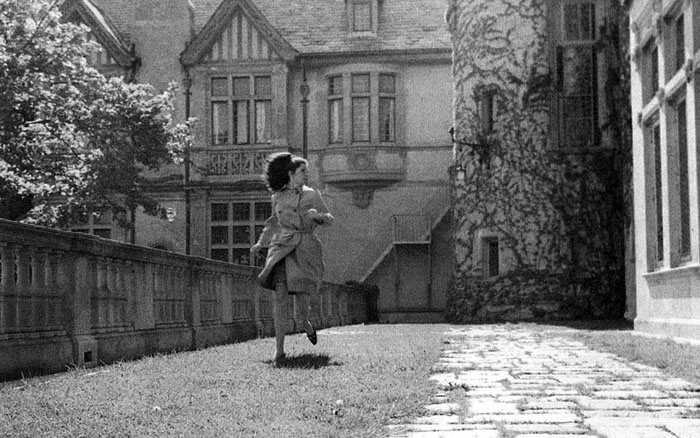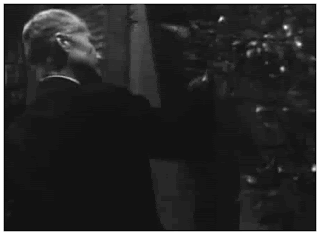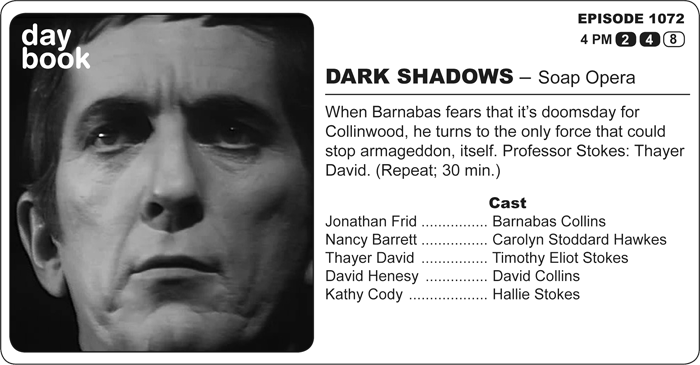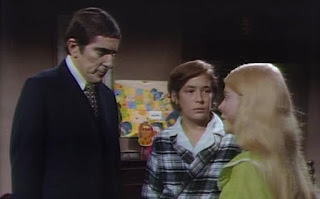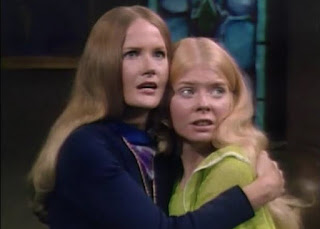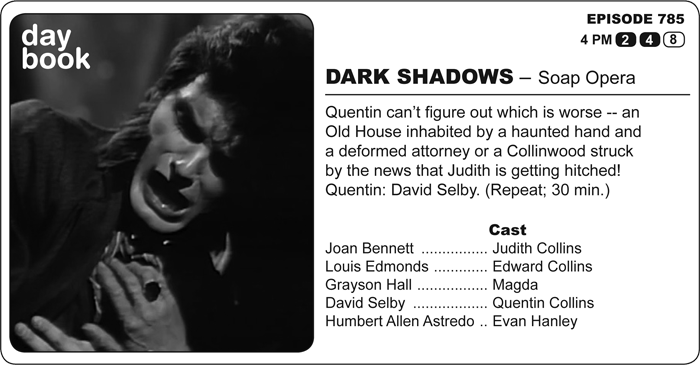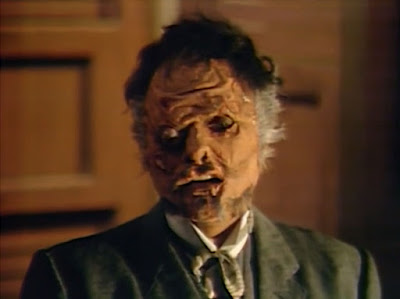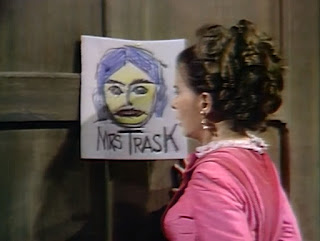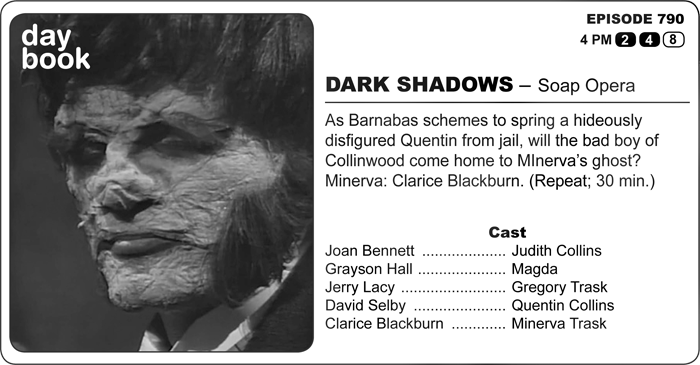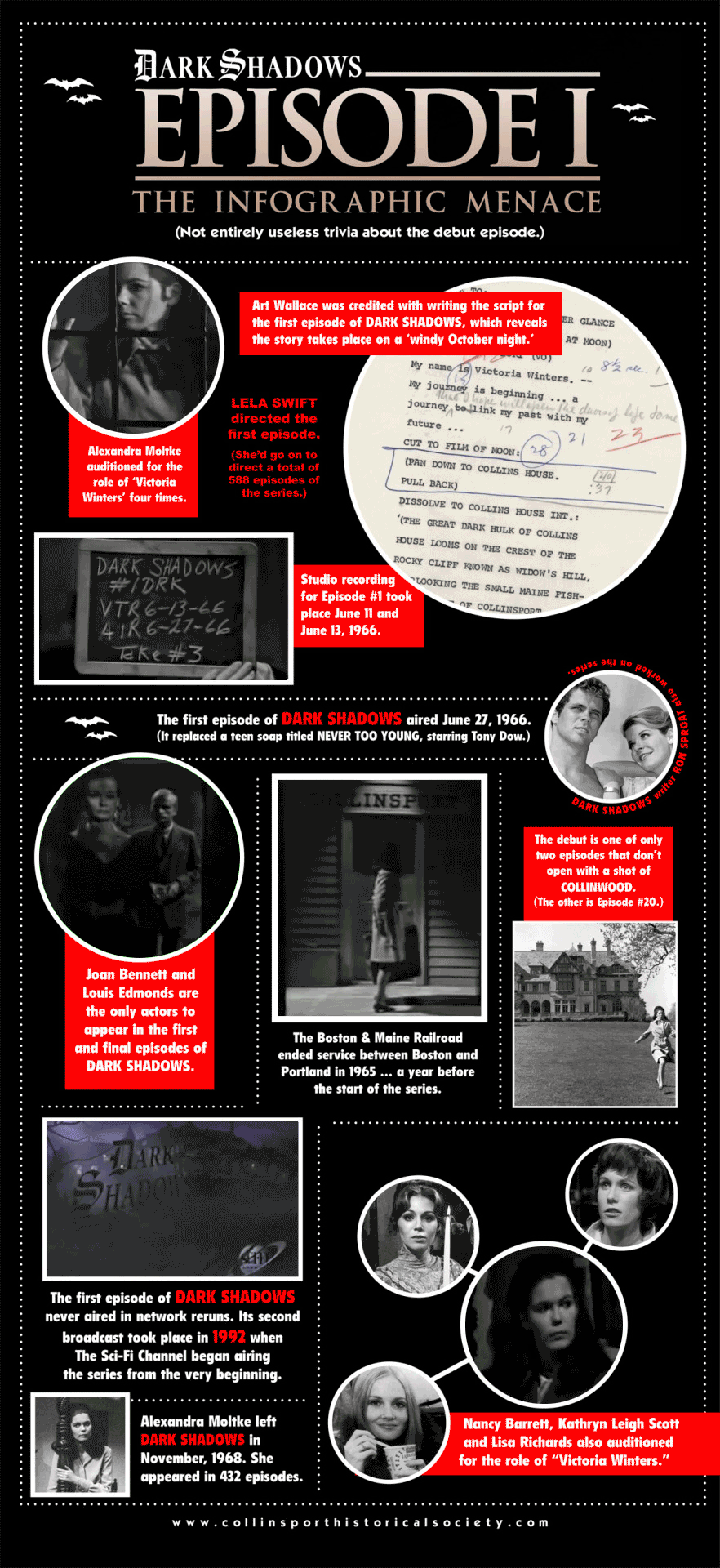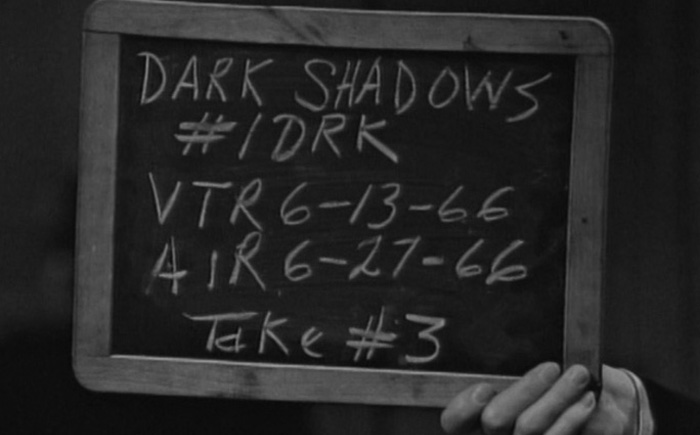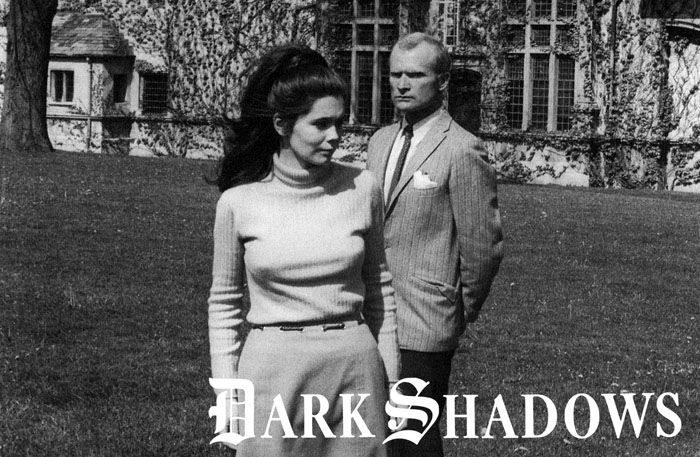
A look back at the first week of Dark Shadows
By WALLACE McBRIDE
It’s hard not to love Victoria Winters, at least in the early days of DARK SHADOWS. Yeah, she’s not the sexiest character on the show, at least from an actor’s perspective. The writers maintained her fragile innocence by divvying the better dialogue and dramatic confrontations among the rest of the cast. This practice lasted long enough for actress Alexandra Moltke — and perhaps even the audience — to lose their patience with the character. After a while, Victoria stopped looking naïve and started looking kind of dim.
 But that wasn’t the case when DARK SHADOWS launched on June 27, 1966. Winters was a blank slate by design and saw the world with a childlike, if reserved, sense of wonder. She was such a sweetheart that the writers discovered almost immediately that the easiest way to establish a villain on DARK SHADOWS is to have them act nasty to Victoria.
But that wasn’t the case when DARK SHADOWS launched on June 27, 1966. Winters was a blank slate by design and saw the world with a childlike, if reserved, sense of wonder. She was such a sweetheart that the writers discovered almost immediately that the easiest way to establish a villain on DARK SHADOWS is to have them act nasty to Victoria.The “pilot” for DARK SHADOWS is one of the most complexly staged episodes of the entire series. Not coincidentally, it is also the only episode of the show's 1,225 episode run to be shot over multiple days. Beginning with the second episode, the unforgiving production demands of a "live on tape" series meant there would never be any second chances to get things right. But the first episode was given two (!) days for taping, both in the studio and around the locations in Connecticut and Rhode Island that served as the exteriors for various Collinsport landmarks. It's worth nothing that some details in the series had yet to be firmly nailed down when the cast first stepped in front of the cameras. Collinwood, for example, is referred to as "Collins House" throughout the first episode script. The name was changed so late in development that some of the promotional materials (not to mention the early tie-in novels my Marylin Ross) continued to use the "Collins House" moniker.
The number of scene changes in this short, 22-minute episode is staggering, especially when you consider the amount of exposition that had to be transported from script to screen in such a short amount of time. We see two locations for the “Foundling Home” in New York, a train car, a train station, the lobby and diner of the Collinsport hotel, Collinwood, the Blue Whale and a handful of pre-filmed location shots. We’re introduced in the opening shot to Moltke as heroine Victoria Winters, a woman with no clear past or future, her reflection looking back at the audience from the darkened window of a train as it speeds through the night. You’ll see Vicki’s reflection quite often in this episode, and it’s this “second” Victoria Winters that she’s come to Collinsport to find. It’s an idealized version of herself, one that has a material connection to the world through her absent family.
Winters hopes she’ll get these answers from her mysterious benefactor, Elizabeth Collins Stoddard (fallen screen ingenue Joan Bennett), who has offered her the job of governess for her nephew. Victoria can’t imagine why a stranger from another state would offer her a job she hasn’t applied for, and rightfully assumes that the two mysteries in her life actually one mystery. Adding fuel to her suspicions: Stoddard’s home is a short drive from the place where Victoria was abandoned as a child.
The identity of Victoria’s parents is a plot point plot that has confounded DARK SHADOWS since the very beginning. Her background is never adequately explained in the original television series, and even became a dangling plot point in the Ross spin-off novels. When Victoria was added to the cast of the 1991 “revival” series and the 2012 movie, neither production seemed to know exactly what to do with the character, leaving their respective actresses to do most of the heavy lifting. While still considered an essential element of DARK SHADOWS, Victoria became a narrative loop of frustration for fans. In June, 1966, though, Victoria was still bae. But her mysterious past isn’t the only unanswered questions posed in the first episode.
Arriving on the same train as Victoria is Mitch Ryan as the show’s first anti-hero, Burke Devlin. Looking a little like the unholy offspring of Lloyd Bridges and Aaron Eckhart, Devlin has a dark mission in Collinsport that somehow involves the Collins family. Meanwhile, Elizabeth’s brother Roger (Louis Edmonds), really really doesn’t want Victoria in Collinwood. Introduced to the series while pouring his trademark glass of sherry, it’s strongly hinted that Roger’s motives for wanting Victoria to fuck off back to NYC have little to do with a singular love of privacy.
Along for the ride (and to provide ominous exposition) is Kathryn Leigh Scott as Maggie Evans, a brassy waitress that's distant from the vulnerable figure she'd later become. Scott, along with every other actress in the cast, had auditioned for the role of Victoria Winters, so there might have been some concern behind the scenes that she too closely resembled Moltke and confuse audiences. Luckily, the production quickly realized that was nonsense.
 The first episode ends on an ominous note, as Victoria crosses the threshold into Collinwood, met by black widow Elizabeth Collins Stoddard. The final scene (hell, the entire episode) is Mythology 101 and one of the reasons why this series continues to resonate with fans all these years later. Collinwood isn’t meant to be a real place: It’s a symbol of the unconscious mind, a place of magic and monsters where Victoria has the chance to discover her “true self," whatever that might mean.
The first episode ends on an ominous note, as Victoria crosses the threshold into Collinwood, met by black widow Elizabeth Collins Stoddard. The final scene (hell, the entire episode) is Mythology 101 and one of the reasons why this series continues to resonate with fans all these years later. Collinwood isn’t meant to be a real place: It’s a symbol of the unconscious mind, a place of magic and monsters where Victoria has the chance to discover her “true self," whatever that might mean.In the second episode we’re introduced to Elizabeth’s daughter Carolyn (Nancy Barrett), a character only hinted at in the series premiere. We meet Carolyn as she's party rocking at the Blue Whale, dancing with any guy in the bar who’s not her boyfriend. In her defense, Joe Haskell (Joel Crothers) is sitting only a few feet away from his girl and doesn’t have much interest in “dancing,” if you catch my drift. Joe is the series’ hero for the first few years, though the writers took sadistic glee at underlining his impotence at every turn. He’s powerless to protect Maggie from Barnabas Collins later in DARK SHADOWS, and here he picks a fistfight with some guys over Carolyn that Burke Devlin has to break up. DARK SHADOWS doesn’t have much use for heroes.
Speaking of introductions, we also get our first taste of the jukebox at the Blue Whale in the second episode, which boasts a few dozen tracks on its playlist but only seems to play the same three songs over and over. But that’s OK, because they’re pretty good tunes.
Carolyn isn’t the most likable person in the episode, finishing a distant last even behind Roger. After intentionally antagonizing the men at bar she goes home to whine to her mother about how she wants more from life than being rich and living in a mansion. I wouldn’t go so far to say she’s spoiled (because Collinwood isn’t the warmest, most nurturing place in the world) but she comes off as bratty.
 It’s strongly hinted throughout the series that Victoria and Carolyn are sisters, and the two characters seem to be running parallel to each other at the start, though they’re moving in opposite directions. Carolyn needs to escape the shadow of her family to find out who she really is, while Victoria thinks she’ll find herself by getting closer to the Collins family.
It’s strongly hinted throughout the series that Victoria and Carolyn are sisters, and the two characters seem to be running parallel to each other at the start, though they’re moving in opposite directions. Carolyn needs to escape the shadow of her family to find out who she really is, while Victoria thinks she’ll find herself by getting closer to the Collins family.Vicky’s answers won’t come easily, though. The more time Victoria spends at Collinwood in the first week, the more isolated she becomes. While strolling the grounds alone (wearing a trenchcoat and looking a little like Bjork cosplaying as Inspector Clouseau) she finally meets Roger, who lays on the charm as they chat at the edge of the (as yet unnamed) Widows Hill. He’s all “Please call me Roger!” until she makes the mistake of saying Burke Devlin’s name. After that, he gets grabby and runs away to parts unknown. Victoria returns to the mansion to find Elizabeth doing her best Robert Smith impersonation while playing piano in the dark.
(Aside: Elizabeth says the painting hanging over the fireplace in the drawing room is of her great-grandfather, Jeremiah — which is impossible, given that Barnabas Collins blew Jeremiah’s brains out before his uncle had chance to spawn. I’ll chalk this error up to Elizabeth’s own confusion. There was a great deal of intentional misinformation concerning the events of 1795, so it’s understandable if facts about that era of Collins history are a little murky.)
The established characters take some time to socialize in the third episode, but the script also adds a new one to the mix: Bill Malloy (Frank Schofield). The head of the Collins shipping fleet, Malloy has taken an interest in Devlin’s arrival, asking him to lay off his already troubled employers. His motives are uncertain (is “altruism” even a thing in Collinsport?) as is his knowledge about Devlin’s business in town.
Roger’s anxiety about Devlin’s arrival also prompts an opportunity for many of the characters to interact. In fact, most of the episode is conversational: Devlin talks to Joe, Roger talks to Maggie, Malloy talks to anybody who stands still for too long. It’s a busy, talky episode, and it’s a credit to the writers that the show has taken on an oppressive air of mystery without giving us the slightest clue as to what’s going on.
I’d be remiss if I didn’t mention the unintentionally hilarious opening. The episode begins with some film of Roger driving up to the Evans home, with a careful cut to the “live” recording of him pounding on a door and shouting “Open up you drunken bum!” The door doesn’t open, Roger walks away and we get the DARK SHADOWS opening credits. Had this been your first episode, you would have been thoroughly baffled about what you were watching. It was a little surreal, but I’d watch an entire episode of Edmonds angrily knocking on random doors in Collinsport.
Carolyn and Victoria meets for the first time in a scene that begins awkwardly before exploring some creepy subject matter: Carolyn has a bit of a crush on her uncle Roger, and seems put out that she’s got to settle for a common fisherman like Joe. Victoria politely entertains this icky display of TMI before the scene mercifully segues into a tour of Collinwood. But strange things are afoot! A door mysteriously swings open behind the two as they discuss a painting of 17th century ancestor Isaac Collins. Carolyn rightfully refrains from calling the Ghostbusters but seems concerned when Vicky finds one of her letters discarded carelessly on her bed. David Collins has yet to make an appearance, but fret not. This might be the third episode, but 24 hours have yet pass since Victoria’s arrival in town.
With episode four, though, we finally get to move the calendar forward a day. Vicki is roused from her bedroom by the sounds of mysterious crying, which lead her downstairs to the drawing room. Collinwood has ghosts, which is hardly a surprise. It also has a sexual predator stalking the corridors in the form of Roger. He’s interrupted by his sister at the start of the episode as he’s letting himself into Victoria’s bedroom shortly before midnight, and Liz’s attitude implies this is a long-standing problem for the family. Insisting he was “merely trying to talk to the girl,” he still manages to bring Victoria downstairs to grill her about her association with Burke.
 Roger is convinced Burke wants to kill and/or destroy him and doesn’t believe his arrival on Victoria’s train is a coincidence. He later gets Vicki alone (where he can better intimidate her) and offers her a drink. She declines, saying the drink “burns,” to which Roger answers “Pain sometimes precedes pleasure, Miss Winters. Or are you too young to have discovered that yet?”
Roger is convinced Burke wants to kill and/or destroy him and doesn’t believe his arrival on Victoria’s train is a coincidence. He later gets Vicki alone (where he can better intimidate her) and offers her a drink. She declines, saying the drink “burns,” to which Roger answers “Pain sometimes precedes pleasure, Miss Winters. Or are you too young to have discovered that yet?”If the rapey vibe of this episode wasn’t gross enough, Vicky’s answer is equally distressing. Instead of getting angry, shocked or offended, the writers use the moment to declare her virginal bonafides: “I’d rather avoid the pain for as long as possible,” she tells Roger as though they were bros.
Carolyn, in one of her many visits to Victoria’s bedroom this night, casually mentions that Roger’s wife (and David’s mother) is not as dead as the new governess was lead to believe. Carolynquickly changes the subject, but the absent wife’s status will become much more important later in the series.
The episode comes to a close with the reveal of Victoria’s charge, David (David Henesy). He’s been mentioned throughout the week but has yet to make an appearance, and his debut doesn’t disappoint. After following the ghostly sobbing to the drawing room, Vicki sees that David has followed her downstairs. His first words to the new governess are “I hate you!” Welcome to the show you loveable little sociopath.
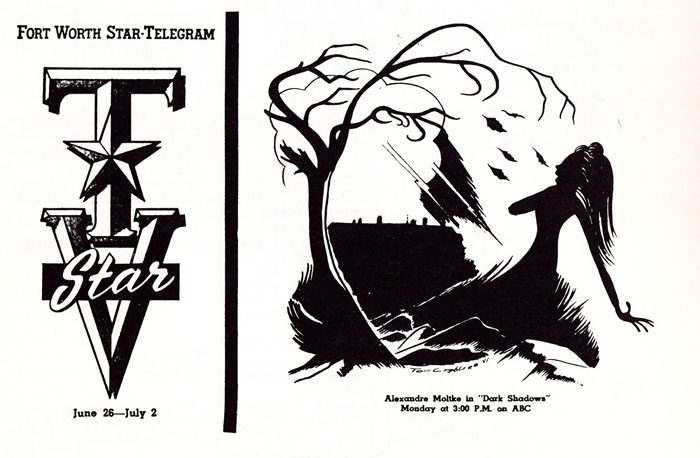
Episode four gave us our first definite signs ghostly activity at Collinwood. As the week closes, one of them gets a name. Sam Evans discloses to Victoria that the mansion is haunted by the spirit of Josette, a French woman brought to Collinsport to marry the builder of Collinwood. The details of this story change a little over the years, but the bullet points remain the same: Shit goes bad, Josette throws herself of Widow’s Hill (formally named in this episode) and ghostly shenanigans ensue for the next few centuries.
The early version of Sam Evans looks and sounds little like the character we’ll get to know over the next year. Mark Allen plays Evans for only seven episodes in the series and is an imposing presence on screen, certainly moreso than David Ford, who will soon replace him. Sam makes a short appearance on this episode, stopping by to ask Victoria to deliver a mysterious non-message to Roger before lumbering off to wherever he came from. I don’t much like this version of Sam, who comes across like a pretentious thug.
Even for Victorias Winters, enough is enough. Five episodes (and 24 story hours) into the series and our heroine is begins packing her bags for home. As she has breakfast with Carolyn, David finishes packing for her, carelessly tossing her clothes into her suitcase while muttering something about his mother. To add injury to insult he defaces her luggage by scratching her initials off the casing.
While trying to talk Victoria out of leaving, Carolyn learns the new governess was raised in a foundling home and is (presumably) an orphan. This nugget of information is delivered to Carolyn as she’s whining about being young and rich, and uses Victoria’s disclosure as an invitation to compete in a “Whose Life Sucks Hardest” rap battle. Carolyn reveals that her mother is a shut-in who hasn’t left home for 18 years, and that her father has been absent her entire life. It’s like a gothic paperback version of 8 MILE.
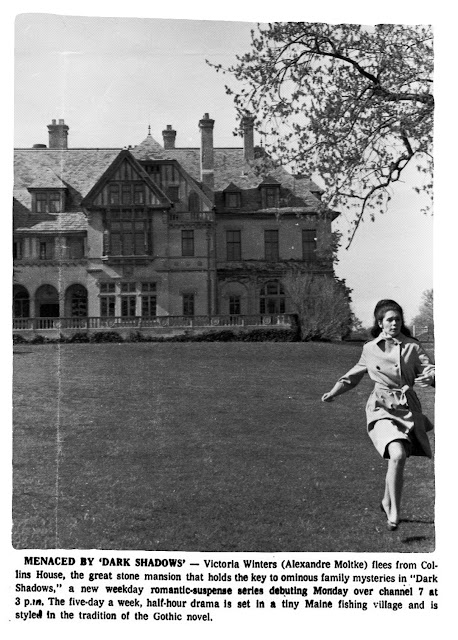 During this scene we also learn that Victoria received $50 a month from a mysterious benefactor until she turned 16, after which she was expected to get a job or something. Carolyn notes those payments started to arrive around the same time her father vanished, but the plot point doesn’t lead anywhere. Not just in this episode, but ever.
During this scene we also learn that Victoria received $50 a month from a mysterious benefactor until she turned 16, after which she was expected to get a job or something. Carolyn notes those payments started to arrive around the same time her father vanished, but the plot point doesn’t lead anywhere. Not just in this episode, but ever.Victoria discovers what David’s done in her room and finds him waiting for her, hiding behind a curtain. He plays a quick game of “keep away” with the note left with Victoria as a baby when she was abandoned at the foundling home. David crumples the only connection she’s got to her real family and throws it to the ground (about a foot away from a piece of tape on the floor identifying the actor’s “mark.”) He then begins an elaborate bit of performance art to illustrate how crazy he really is: Ghosts have told him to get rid of Victoria. Granted, we know there are ghosts at Collinwood, but David’s galloping mental illness and the haunting of Collinwood aren’t mutually exclusive concepts. The combination of David’s mommy issues and his proclivity for rummaging in Victoria’s drawers means the new governess could find herself participating in a reenactment of the shower scene from PSYCHO.
Having been confronted with a maniac for a student, a sexual predator for a housemate, a chronically depressed employer and the promise for unwanted drama in the future, Victoria is uncertain of her future at Collinwood. “I’d be a fool to keep on staying here,” Victoria says about 30 seconds before she decides to keep on staying here.
Welcome to Collinwood, Victoria Winters.

